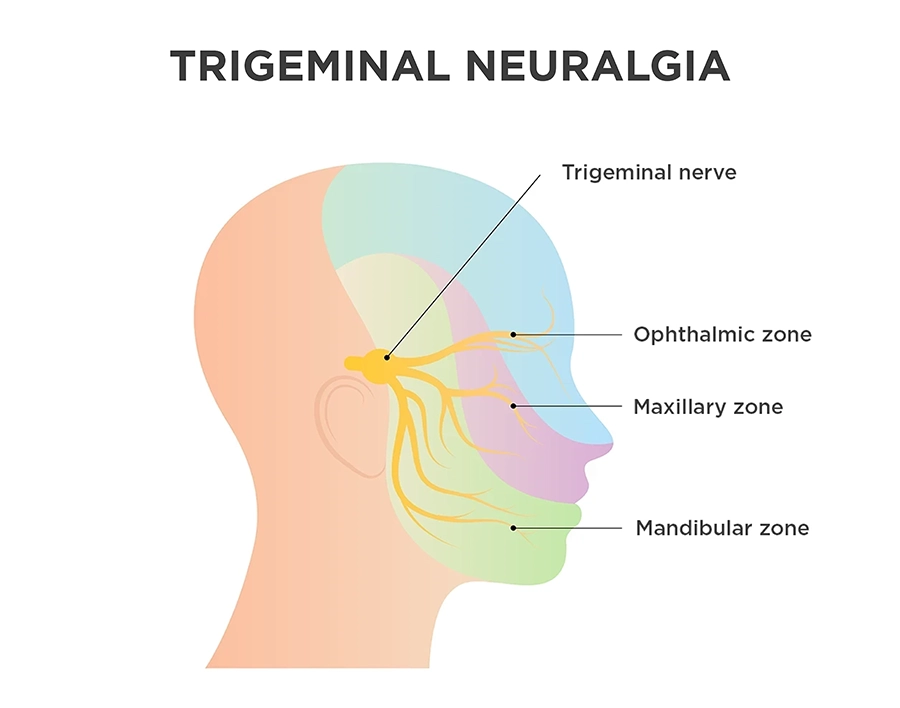Trigeminal neuralgia
Find a neuro specialistIf you have trigeminal neuralgia, you’ll feel sudden and intense facial pain. This pain stems from compression of your trigeminal nerve, which is responsible for sensations in your forehead, cheeks, jaw and the area around the eye.
Trigeminal neuralgia pain can interrupt your daily life. Our specialists are here to help by accurately diagnosing trigeminal neuralgia, so you can get the personalized treatment you need.
What is trigeminal neuralgia?

The trigeminal nerve affects nerves in all three zones of the face. Trigeminal neuralgia may cause pain in any zone.
Trigeminal neuralgia is a chronic pain condition that affects the trigeminal nerve.. Often characterized as one of the most excruciating types of pain, trigeminal neuralgia profoundly impacts your daily life, making routine activities very challenging.
Trigeminal neuralgia causes
Your trigeminal nerve is responsible for transmitting sensations from your face to the brain. When this nerve is compressed, trigeminal neuralgia happens. Typically, this compression is due to a blood vessel putting pressure on the trigeminal nerve. However, trigeminal neuralgia can also be prompted by factors such as tumors or infections.
Typically localized to one side of the face, this debilitating pain can be triggered by seemingly small actions like brushing teeth, facial touch, chewing or even exposure to gentle gusts of air.
Trigeminal neuralgia symptoms
The primary symptom of trigeminal neuralgia is sudden, severe and sharp facial pain.
In addition to the facial pain, you may experience other trigeminal symptoms, including:
- A constant burning sensation or aching in the affected area
- Muscle spasms in the face
- Numbness and tingling in the face before feeling pain
This pain is typically experienced on one side of the face and can be triggered by things such as:
- Brushing teeth
- Drinking hot or cold beverages
- Eating
- Exposure to cold air or wind
- Touching the face
- Smiling or facial expressions
- Speaking
The pain is said to feel like electric shock or stabbing. It typically is felt from a few seconds to several minutes. Periods of remission, during which the individual is pain-free, may occur between these episodes.
Symptoms can vary from person to person, and the severity and frequency of pain episodes may differ significantly. If trigeminal neuralgia is suspected, schedule an appointment with your doctor as soon as possible.
What happens if trigeminal neuralgia goes untreated?
If left untreated, trigeminal neuralgia symptoms may worsen over time and the episodes of intense facial pain associated with this condition may escalate in frequency, duration and severity.
You may also experience weight loss due to eating difficulties or disruptions in your sleep patterns. These complications can further complicate your condition and pose challenges to overall health and wellness.
How do I know if my trigeminal nerve is damaged?
Depending on the extent and location of the trigeminal nerve damage, you may experience signs and symptoms that indicate trigeminal nerve damage:
- Altered reflex responses
- Face asymmetry
- Facial pain
- Muscle weakness
- Numbness or tingling
- Sensory loss
Diagnosing trigeminal neuralgia
Typically, a trigeminal neuralgia diagnosis involves a review of your medical history and a detailed discussion of your symptoms during a physical examination. Your doctor may then refer you to a neurologist or a pain specialist for further evaluation.
Imaging tests such as an MRI or CT scan are often used to diagnose trigeminal neuralgia. These tests also rule out other potential causes of your facial pain, including dental pain or tumors.
Additional diagnostic tests may be recommended. These include:
- Neurological tests: Evaluates your sensory function, reflexes and muscle strength to check on the integrity of your trigeminal nerve.
- Nerve conduction studies: These tests gauge the electrical activity of the trigeminal nerve, helping detect any abnormalities in nerve function.
- Electromyography (EMG): Assesses muscle activity and identifies any anomalies in facial muscles linked with trigeminal neuralgia.
Treatment options for trigeminal neuralgia
Your doctor will work with you closely to determine the best treatment plan for you. Various factors, including your personal preferences, your symptoms and the underlying cause of your trigeminal neuralgia will be considered.
Common trigeminal neuralgia treatment options include:
- Medication: Antiseizure medications are commonly prescribed to alleviate nerve pain associated with trigeminal neuralgia. Muscle relaxants and antidepressants may also be recommended.
- Nerve blocks: Injecting a local anesthetic, such as lidocaine, directly into the vicinity of the trigeminal nerve can offer temporary relief from pain.
- Microvascular decompression: Is a common minimally invasive surgical intervention aimed at relieving pressure on the nerve caused by a blood vessel.
- Stereotactic radiosurgery: Utilizing advanced technologies like CyberKnife®, this non-invasive, robotic system delivers targeted high doses of radiation to the affected nerves.
- Acupuncture: While evidence regarding its effectiveness is mixed, some individuals report relief from trigeminal neuralgia symptoms through acupuncture.
Get care
We help you live well. And we’re here for you in person and online.